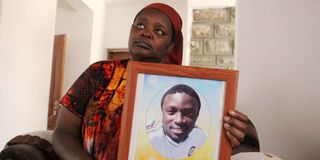Premium
Double tragedy for family with ailing kin

Ms Nereah Ochieng holds a portrait of her son Isaac Odhiambo at their home in Ndatani Star in Utawala on September 5, 2020.
What you need to know:
- Isaac Odhiambo died out of a hospital’s “negligence”, according to his relatives.
- He was tossed between four city hospitals, all of which could not arrest his deteriorating health.
A loss. Then grief. And before the dust settles, tragedy strikes again. All in a span of less than six months, 23-year-old Isaac Odhiambo’s ailing frame was treated like a ping-pong ball.
He was tossed between four city hospitals, all of which could not arrest his deteriorating health.
The hospitals were like demotivated players, deliberately missing the target. The spectators— his parents and other family members, watched on, hoping that someone would at least get it right. No one did, sadly.
And now, not just one, but two members of a city family have been lost. First Isaac, the son. Then, Franklin Ochieng’, his father. Isaac died out of a hospital’s “negligence”, according to his relatives.
His father, Franklin, died hoping that his lifeless son’s body would be given to him someday. He had wished to bury him. Now he needs burial too.
“On February 10, when my husband and I took our son to hospital, even though he was sick, I still hoped he would get better and stay with me longer. But now, he is gone forever, and his body, six months after his death, still lies at the Lee Funeral Home. His father too, is gone,” narrates Nereah Ochieng’, now a widow.
Metropolitan Hospital
When Ochieng’s family decided to take their son for check-up on February 10, the final year student whose classmates graduated two months after his death was very sick. They went to Metropolitan Hospital in Buruburu, where he had previously taken a number of tests.
“They told us that he had developed complications on his bone marrow. Since his health was not getting any better, Metropolitan Hospital referred as to the Kenyatta National Hospital,” Mrs Ochieng recalls. At KNH, the reception was like that of a beautiful envelope, with sad news in it.
They were hoping to see a haematologist, since the previous hospital hinted that their son’s bone marrow could be the problem.
“When the doctors at KNH saw our son’s documents, they advised us that he needed to be admitted to the ward, but there were no beds,” Mrs Ochieng says.
“We tried to plead with them but they told us to come after two days, and gave us an alternative hospital to go to — The Coptic Hospital.”
Off, they went to the Coptic Hospital. There, their son was not even examined. His medical history alone spoke volumes about his condition.
“They said ‘we cannot treat him. Take him to The Nairobi Hospital or the Aga Khan University Hospital because they have blood machines’”.
Immunity dropped
It was 11pm. They opted for The Nairobi Hospital, for the night, so that they could look for an alternative the following day.
“At The Nairobi Hospital, tests were taken, indicating that his immunity had significantly dropped, he could not be moved as we wished.”
On February 11, when they came to check on their son, they found him at the Intensive Care Unit (ICU), a place he stayed until his death on March 6.
“While in the ICU, they kept adding blood to his body, but there was no sign of improvement,” her mother recounts.
“At some point, they had given up, and they asked us to get our own specialist,” she adds.
They did all they could and found an alternative haematologist. But, the hospital’s bureaucracies failed them. The hospital was to contact the haematologist for what they termed as “vetting.”
They never did, according the family.
Isaac’s sister Yvonne Ochieng’ says, “I kept reminding them, but they did not contact our specialist, so my brother died without us knowing what exactly he was ailing from.”
During his stay in the ICU, they were told that he could be suffering from a certain type of tuberculosis, or the kidneys may have failed so he was on dialysis at some point. But, no form of treatment saved the young man.
Contacted by the Nation, the Nairobi Hospital Management replied: “The Nairobi Hospital respects clients’ confidentiality and therefore does not discuss such details.”
Twenty-five days later, he died, leaving behind a bill of about Sh10 million. The family at the time was already financially strained.





